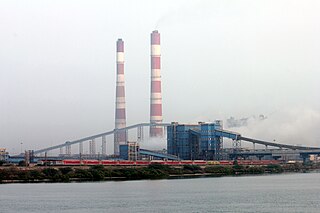India is the third largest producer of electricity in the world. During the fiscal year (FY) 2022–23, the total electricity generation in the country was 1,844 TWh, of which 1,618 TWh was generated by utilities.
The Karachi Nuclear Power Plant is a large commercial nuclear power plant located at the Paradise Point in Karachi, Sindh, Pakistan.

The Hub Power Company Limited, colloquially known as Hubco, is a Pakistani power company based in Karachi, Sindh. It was the first independent power producer (IPP) to establish in Pakistan and as of 2024 is the largest IPP with a combined installed power generation capacity of 3,581 MW. The revenue of the company is United States Dollars denominated.
The Chashma Nuclear Power Plant is a large commercial nuclear power plant located at Chashma in Mianwali, Punjab, Pakistan.
Wind power is a form of renewable energy in Pakistan which makes up more than 6% of the total electricity production in the country. As of 2018, wind power capacity in Pakistan was 1,287 MW. The government is looking to increase the share of renewable energy and plans to add around 3.5 GW of wind energy capacity by 2018.

The Pakistan Water & Power Development Authority is a government-owned public utility agency maintaining hydropower and water in Pakistan, although it does not manage thermal power plants. WAPDA includes Tarbela and Mangla dams among its resources. Its headquartered in Lahore.

Solar power in Pakistan became part of the energy mix in 2013, following government policies aimed at supporting renewable energy development. Benefiting from nine and a half hours of sunlight daily, the country now has seven solar projects that contribute 530 MW to the national grid. Rising electricity costs and grid reliability concerns have driven industries, businesses, and urban homeowners to increasingly turn to solar solutions, including rooftop photovoltaic installations.

The energy policy of Pakistan is formulated and determined by the federal, provincial, and local institutional entities in Pakistan, which address the issues of energy production, distribution, and consumption of energy, such as gas mileage and petroleum standards. Energy policy requires the proper legislation, international treaties, subsidies and incentives to investment, guidelines for energy conservation, taxation and other public policy techniques.
Nashik Thermal Power Plant is located at Eklahare village near Nashik in Maharashtra. The power plant is one of the coal based power plants of Maharashtra State Power Generation Company (Mahagenco)
Kakatiya Thermal Power Station is located near Chelpur village of Ghanpur mandal in Warangal district of the Indian state of Telangana. The power plant is one of the coal based power plants of TSGENCO

Adani Power is an Indian multinational power and energy company, subsidiary of Adani Group and based in Khodiyar in Ahmedabad, India. It is a private thermal power producer, with a capacity of 15,250 MW and operates a mega solar plant of 40 MW at Naliya, Bitta, Kutch, Gujarat. Adani Godda Power is implementing a 1,600 MW plant at Jharkhand. The company has signed long term power purchase agreements of about 9,153 MW with the government of Gujarat, Maharashtra, Haryana, Rajasthan, Karnataka, and Punjab.

NTPC Limited, formerly known as National Thermal Power Corporation, is an Indian central Public Sector Undertaking (PSU) under the ownership of the Ministry of Power and the Government of India, who is engaged in the generation of electricity and other activities. The headquarters of the PSU are situated at New Delhi. NTPC's core function is the generation and distribution of electricity to State Electricity Boards in India. The body also undertakes consultancy and turnkey project contracts that involve engineering, project management, construction management, and operation and management of power plants.

NTPC Kanti also known as George Fernandes Thermal Power Plant Station is located in Kanti, Muzaffarpur, Bihar. George Fernandes was former Member of Parliament from Muzaffarpur constituency of Bihar. It is wholly owned subsidiary company of NTPC. The share of the company is 100% of the NTPC. The plant was not functional between 2003 and 2013; however, renovation of both older units paved the way for commercial production of electricity by the end of 2013.
Bihar State Power Holding Company Limited (BSPHCL), formerly Bihar State Electricity Board (BSEB) is a state-owned electricity regulation board operating within the state of Bihar in India. BSEB was established in 1958 as a statutory corporation under the Electricity (Supply) Act, 1948. As of November 2012, BSEB has nearly 1,700 officers and 14,850 employees. The derated capacity comes to just 530 MW. The BSEB was unbundled on 2 August 2011. Power Finance Corporation was the main consultant for BSEB's restructuring.

Barh Super Thermal Power Station or NTPC Barh is located in Barh in the Indian state of Bihar. NTPC Barh is located barely four kilometres (2.5 mi) east of the Barh sub-division on National Highway-31 in Patna district. The project has been named a mega power project, and is owned by Indian energy company National Thermal Power Corporation.

Jamshoro Thermal Power Station also known by other names such as GENCO-I, and TPS Jamshoro is a gas / furnace oil and coal based thermal power plant with a total installed capacity of 880 MW located in Jamshoro near Hyderabad, Sindh in Pakistan. It is operated by the Jamshoro Power Company. The first phase of the project was commissioned between 1989 and 1991. It consists of one 250 MW unit and three 210 MW units. The power station is undergoing a planned expansion with additional 2 x 660 MW coal fired units. One 660 MW unit has been constructed and is ready for commissioning. Site preparation of second 660 MW unit is in progress with an expected commissioning date of July 2029.

Vallur Thermal Power Station is a power plant located in Vallur, Thiruvallur district, India. The power plant is operated by NTPC Tamil Nadu Energy Company Limited, a joint venture between NTPC Limited and TANGEDCO and has three units with 500 MW each.
Guddu is a town in Sindh, Pakistan located about 10 km from Kashmore in the district of Kashmore, 650 km north of Karachi. Population of this town is 24,516 per 2017 Census of Pakistan.











